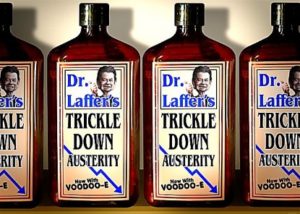The “trickle down” assumption
Extract from an article by Ted Trainer
The following extract made by the editor of RWER blogs on 8 April 2021 [1] is from a larger article by Ted Trainer that appeared in issue number 95 of Real World Economics Review [2].
“ The basic justification for conventional development is that although it mostly enriches the rich, in time ‘…wealth will trickle down to benefit all.’ There is indeed a tendency for this to happen, but there are several reasons for rejecting this strategy.
Little trickles down
In the global economy the amount of benefit that trickles down is evident in the fact that one-fifth of the world’s people now receive about 70 times the amount of income the poorest one-fifth get, and according to a number of studies such as by Hickel (2017) the ratio is getting worse.
Edward and Summer (2013) also report that between 1990 and 2010 global consumption increased by $10 – $15 trillion, but 1% of people received 15% of it. The gain for each of them was 637 times as much as the gain for the poor- est 53% of the world’s people.
The strongest justification for the trickle down strategy is the claim that poverty has been greatly reduced. The conditions large numbers experience have indeed improved greatly, but the situation is complex and the overall effects are debated.
The reduction in global poverty rates seems to have been due mostly to achievements within China (Hickel, 2017). Edward and Summer (2013) find that if Chinese figures are omitted then there has been little if any improvement in global inequality and poverty rates in recent decades.
Conventional ‘development’ also impoverishes; what are the net effects?
Conventional economists typically enthuse about gains and benefits but fail to attend to the losses and costs. Conventional development drives some people into poverty, mainly by depriving them of resources and livelihoods they once had. When governments allow corporations to log forests and build dams and mines, tribal and peasant people can be removed from their ancestral lands.
Fletcher (2016) quoting the UN Human Development Report says that in 2003 after decades of Neoliberal development, 54 nations were poorer than they had been in 1990, and Sub-Saharan Africa had a lower per capita income than 40 years before. (See also Hickel, 2016.) The poor in Third World countries that are most integrated into the global economy have fared worse than those in other countries (Wodin and Lucas, 2006, p. 55, Meredith, 2005).
It is not clear how big the net gains in income, employment and welfare have been but the above evidence on global poverty changes suggest that they have not been as spectacular as is commonly claimed.
The rate of trickle down development is extremely slow
At present rates it would probably take more than a hundred years for the ‘living standards’ of the poor majority in the Third World to rise to present rich world levels…and by that time the rich world GDP per capita would have become extreme. Yet if the available resources could be applied directly by people to meeting their own needs then rapid improvements would easily be achieved.
The moral issue
The trickle down rationale promises to improve the welfare of those in great need via crumbs from the tables of the rich. Most of the benefit of conventional development goes to national elites, foreign corporations and the rich world consumers. A morally acceptable development process would prioritize improving the conditions of the poorest.
The global resource situation will not permit Trickle Down to work
The strongest argument against trickle- down doctrine is that the limitations to growth rule out any chance that development which promises to lift the poor to rich world affluence via trickle down benefits can succeed. There are far too few resources for this to be achieved. “
- https://rwer.wordpress.com/2021/04/08/the-trickle-down-assumption/
- http://www.paecon.net/PAEReview/issue95/Trainer95.pdf
Dr Ted Trainer is an ERA patron.

Once you realize that trickle-down economics does not work, you will see the excessive tax cuts for the rich as what they are — a simple upward redistribution of income, rather than a way to make all of us richer, as we were told. — Ha-Joon Chang
The rich are always going to say that, you know, just give us more money and we’ll go out and spend more and then it will all trickle down to the rest of you. But that has not worked for a considerable time, and I hope the American public is catching on. — Warren Buffett



























